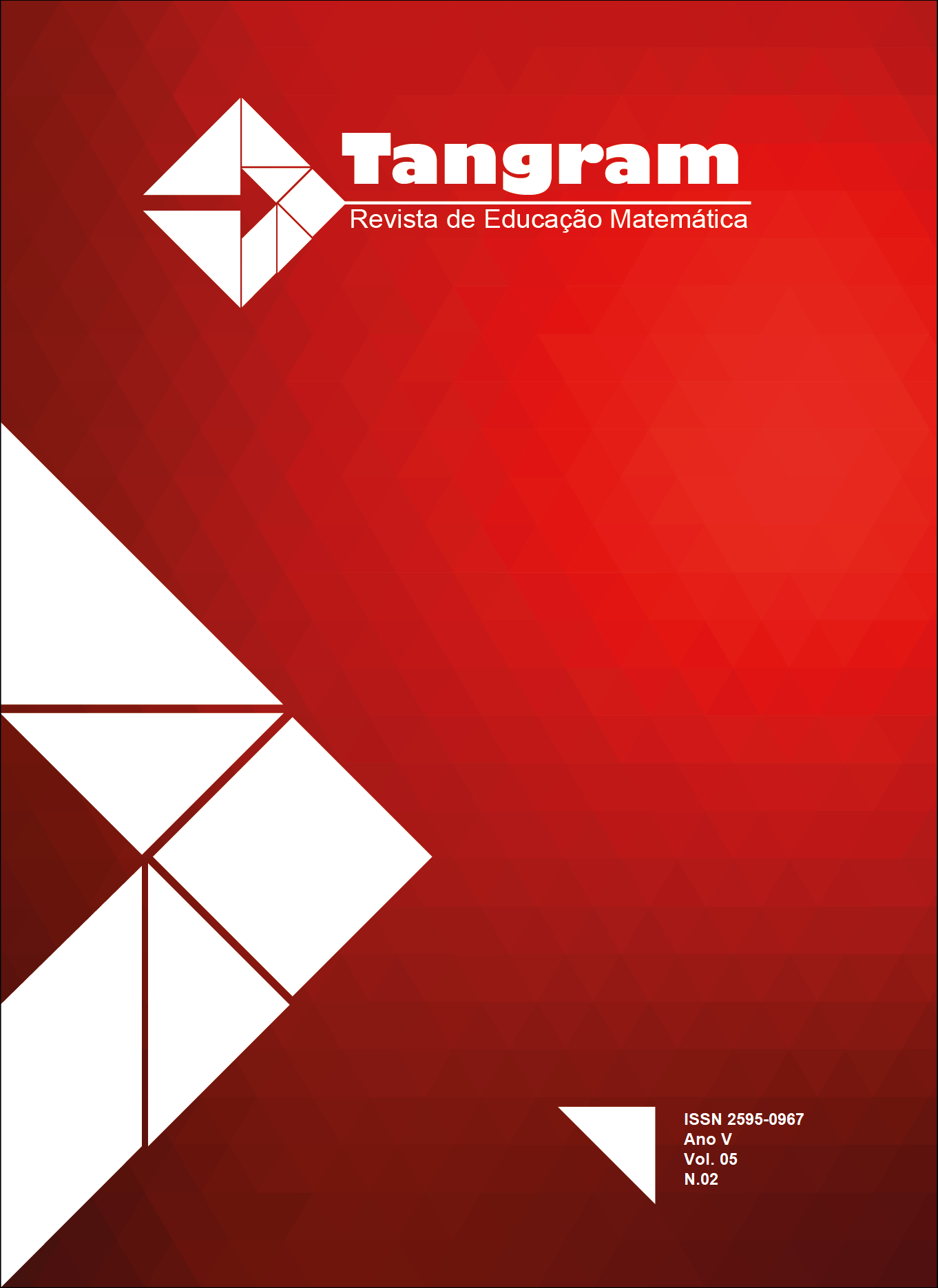A recta numérica e jogo de sinais posicional e operacional no ensino da adição e subtração de números inteiros na 8ª classe
DOI:
https://doi.org/10.30612/tangram.v5i2.15900Keywords:
Sign game. whole numbers. number line.Abstract
Objective of the research was to characterize the basis of arguments used by Mathematics teachers to teach addition and subtraction of Integer numbers on the number line. An online questionnaire was applied and only 4 Mathematics Graduated teachers who have 1 to 12 years of experience in teaching the Integers in grade 8. The results indicate that the teaching of whole numbers via the number straight line is not permeated by epistemological obstacles. The game of the signs, although not justified its coherence has been an argumentative exit to justify contradictions.
Downloads
References
Amadeo, M.S. (2013). Desenvolvimento da noção de reta numérica e seus contextos de 1708 a 1829. Universidade Federal do Rio de Janeiro. Programa de Pós-Graduação em Ensino de Matemática. Dissertação de Mestrado à obtenção do título de Mestre em Ensino de Matemática. Rio de Janeiro.
Amorin, S.R. C. (2012). Números Inteiros: panorama de pesquisas produzidas de 2001 a 2010. Dissertação apresentada à Banca Examinadora da Pontifícia Unversidade Católica de São Paulo como exigência para obtenção do titulo de Mestre Profissional em Ensino de Matemática. São Paulo.
Castro, E.C. (2015). Obstáculos epistemológicos en la enseñanza de los números negativos. Memoria presentada para optar al Título de Doctor por la Universidad de Zaragoza, realizada bajo la dirección del profesor Dr. Guy Brousseau. Zaragoza.
Glaeser, G.(2010). Epistemologia dos Números Negativos. Reedição de Wanderley Moura Rezende e Bruno Alves Dassie. In: Boletim GEPEM, n. 57, jul./dez, 2010. Trad. do original: Épistémologie des nombres relatifs, in: Recherches en didactique des mathématiques.
INDE. (2015). Programas das Disciplinas do 1o Ciclo do Ensino Primário, Maputo, Mocambique.
INDE. (2007). Matemática, Programa da 8ª Classe; Maputo, Mocambique..
Martins, A.P. C. (2013). Uma análise do ensino das operações com números relativos. Universidade do Extremo Sul Catarinense - Unesc Pós-graduação lato sensu - especialização em educação matemática (Monografia). Criciúma.
Neto, F. T.R.(2010). Dificuldades na aprendizagem operatória de números inteiros no Ensino Fundamental. Dissertação submetida à Coordenação do Curso de Mestrado Profissional no Ensino de Ciências e Matemática da Universidade Federal do Ceará, como requisito parcial para obtenção do grau de Mestre em Ciências e Matemática. Fortaleza.
Rosa, J. E. (2012). Proposições de Davydov para o ensino de matemática no primeiro ano escolar: inter-relações dos sistemas de significações numéricas. Universidade Federal do Paraná. Tese apresentada ao Programa de Pós- Graduação em Educação da Universidade Federal do Paraná, como exigência parcial à obtenção do título de Doutora em Educação. Cutiriba.
Downloads
Published
How to Cite
Issue
Section
License

This work is licensed under a Creative Commons Attribution-NonCommercial-ShareAlike 3.0 Unported License.
Authors must accept the publication rules when submitting the journal, as well as agree to the following terms:
(a) The Editorial Board reserves the right to make changes to the Portuguese language in the originals to maintain the cultured standard of the language, while respecting the style of the authors.
(b) Authors retain the copyright and grant the journal the right to first publication, with the work simultaneously licensed under the Attribution-NonCommercial-ShareAlike 3.0 Brazil (CC BY-NC-SA 3.0 BR) that allows: Share - copy and redistribute the material in any medium or format and Adapt - remix, transform, and create from the material. CC BY-NC-SA 3.0 BR considers the following terms:
- Attribution - You must give the appropriate credit, provide a link to the license and indicate whether changes have been made. You must do so under any reasonable circumstances, but in no way that would suggest that the licensor supports you or your use.
- NonCommercial - You may not use the material for commercial purposes.
- Sharing - If you remix, transform, or create from material, you must distribute your contributions under the same license as the original.
- No additional restrictions - You may not apply legal terms or technological measures that legally restrict others from doing anything that the license permits.
(c) After publication, authors are allowed and encouraged to publish and distribute their work online - in institutional repositories, personal page, social network or other scientific dissemination sites, as long as the publication is not for commercial purposes.






